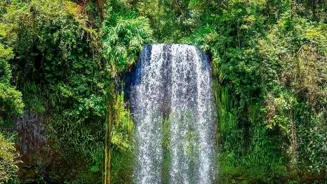Discover the Rise of Eco-Tourism in India: 7 Leading Destinations! Embrace responsible travel and explore nature-friendly hotspots!
Incredible India, with its diverse landscapes and rich cultural heritage,
is witnessing a significant shift in travel preferences.
Forget crowded beaches and bustling city tours; the modern Indian traveller is increasingly seeking experiences that are not only enriching but also environmentally responsible.
This growing interest has fueled the rise of eco-tourism, a form of travel that focuses on preserving natural environments and benefiting local communities.
From the serene hills of the Himalayas to the lush backwaters of Kerala, several destinations are leading the charge in promoting sustainable tourism practices.
So, pack your bags, embrace responsible travel, and explore these eco-tourism hotspots that showcase the best of India's natural beauty while minimizing the impact on the environment.
India, for so long linked with busy roads and packed monuments, it experiencing a refresh in how people want to go for vacations. More and more, people are search for trips that are good for the earth and help those people who live there. This is eco-tourism, and it is getting very popular.
From snowy mountains to green rivers, places are starting to show how travel can be amazing without hurting nature. Let's check out some destinations in India which are doing a good job in Eco-tourism.
Kerala: God's Own Country Embraces Sustainability
Kerala, fondly known as "God's Own Country," has long been a popular tourist destination. However, it is now taking significant strides towards sustainable tourism.
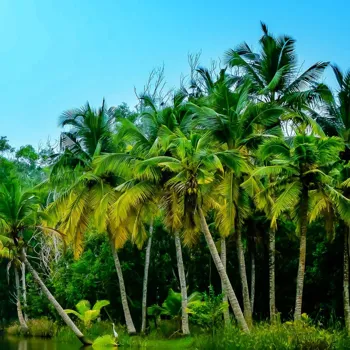
The state government is actively promoting eco-friendly initiatives, such as responsible waste management, conservation of water resources, and support for local communities.
Houseboat tourism, a major attraction in the backwaters, is undergoing a transformation, with many operators now opting for eco-friendly boats powered by solar energy and equipped with efficient waste treatment systems.
Thekkady, with its Periyar National Park, offers opportunities for wildlife enthusiasts to explore the rich biodiversity of the region through guided nature walks and boat safaris, all while adhering to strict environmental guidelines.
Munnar, known for its tea plantations, is also encouraging sustainable farming practices and promoting eco-lodges that blend seamlessly with the surrounding landscape.
Kerala's commitment to responsible tourism is evident in its efforts to educate tourists about the importance of preserving its natural heritage and encouraging them to actively participate in conservation efforts.
Kerala, so green and lovely, is trying very hard to make tourism that is gentle on the environment. They are serious about keeping things clean, saving water, and helping those who live there.
The houseboats, a big attraction, are now becoming eco-friendly, using power from the sun and managing waste wisely. Thekkady has the fascinating Periyar National Park, there you can walk and take boat rides while making sure to keep the environment safe.
Even in Munnar which is famous for tea, are now adapting eco-lodges so that it does not spoil the natural beauty.
Sikkim: A Himalayan Haven of Eco-Consciousness
Nestled in the Himalayas, Sikkim is a shining example of eco-tourism in India. The state government has implemented strict regulations to protect its pristine environment. Sikkim was also India's first fully organic state, banning the use of chemical fertilizers and pesticides in agriculture.
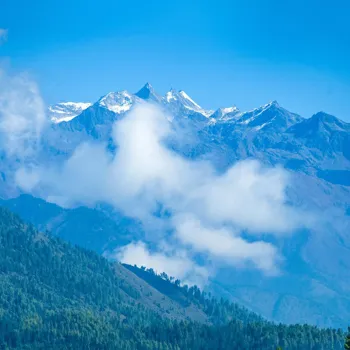
This commitment to organic farming extends to the tourism sector, with many hotels and resorts serving locally sourced, organic food to their guests.
Community-based tourism initiatives are also thriving in Sikkim, allowing visitors to experience the local culture and traditions while directly benefiting the local communities.
Trekking is a popular activity in Sikkim, and the state promotes responsible trekking practices, such as proper waste disposal and minimal impact on the fragile mountain ecosystem.
The Khangchendzonga National Park, a UNESCO World Heritage Site, is a must-visit for nature lovers, offering breathtaking views of the Himalayas and a chance to spot rare and endangered species.
Sikkim's dedication to preserving its natural beauty and promoting sustainable practices has made it a role model for other states in India.
Sikkim, high up in the mountains, is a great example of Eco-tourism.
People who lives in the area and visitors are both working to keep the place looking pure and real. Sikkim does not allow harmful things like chemical fertilizers, which means the food you get is so pure. People are welcome to visit the villages.
And when you are welcome to visit the villages, you are helping those who live there too. Hiking is popular there are many things to explore. Tourists are told about how to protect the environment, Khangchendzonga National Park is for nature lover that should never be missed out.
Meghalaya: Abode of the Clouds and Living Root Bridges
Meghalaya, also known as the "Abode of the Clouds," is blessed with abundant rainfall, lush greenery, and unique living root bridges. The state is actively promoting eco-tourism by encouraging visitors to explore its natural wonders in a responsible manner.

The living root bridges, formed by carefully guiding the roots of rubber trees across streams, are a testament to the ingenuity of the local Khasi and Jaintia tribes. These bridges are not only a fascinating sight but also a sustainable alternative to traditional bridges.
Meghalaya is also home to several national parks and wildlife sanctuaries, offering opportunities for wildlife viewing and birdwatching.
Ecotourism initiatives in Meghalaya focus on empowering local communities by providing them with sustainable livelihood options, such as guiding, homestays, and crafting traditional handicrafts.
Meghalaya, so green with its living root bridges, is working hard to make sure travel is done the right way. The root bridges, created by the people who live there, are a special attraction. They show how smart people can be when working with nature.
Meghalaya is also keen on helping people who lives here, giving them ways to earn money without hurting the environment.
Ladakh: High-Altitude Eco-Adventure
Ladakh, the "Land of High Passes," is a rugged and breathtakingly beautiful region in the Himalayas. Despite its harsh climate and fragile ecosystem, Ladakh is emerging as a popular eco-tourism destination.
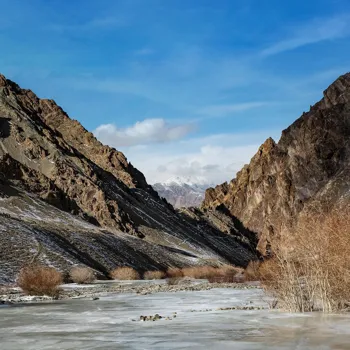
The region is promoting sustainable tourism practices, such as responsible waste management, water conservation, and the use of renewable energy sources.
Homestays are becoming increasingly popular in Ladakh, allowing visitors to experience the local culture and traditions while providing income to local families.
Trekking and mountaineering are popular activities in Ladakh, and tour operators are encouraged to follow strict environmental guidelines to minimize their impact on the fragile mountain environment.
The Hemis National Park, home to the elusive snow leopard, is a major attraction for wildlife enthusiasts. Ladakh's commitment to sustainable tourism is helping to preserve its unique natural beauty and cultural heritage for future generations.
Ladakh, very high up, is a tough place to live, but even here, eco-tourism is becoming famous. People are learning to save water, keep things clean, and use energy that does not harm the earth. Staying with local families is a good way to see how those people live while supporting them.
If you love wildlife, the Hemis National Park, where you can find snow leopards, is a must-see.
Karnataka: Coorg and Western Ghats Biodiversity
Karnataka also has Coorg and the Western Ghats, which are treasure boxes of nature. Eco-tourism here means protecting forests and wildlife, where homestays and responsible tourism practices are encouraged.
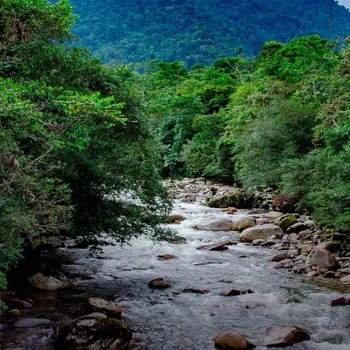
This initiative promotes conservation while offering tourists a genuine experience of their natural beauty.
There is a wonderful part of India where Eco-tourism is shining. The state of Coorg and the area of Western Ghats are both precious places for the natural world.
Eco-tourism here is all about protecting animals, the forests, and encourage tourisms that don't cut the natural resources. By doing this visitors get to see the natural beauty while making sure it remains safe for the future.
Himachal Pradesh: Sustainable Hill Station Tourism
Himachal Pradesh known for its hill stations like Shimla and Manali, is increasingly promoting sustainable tourism practices. This includes encouraging eco-friendly accommodations, promoting local culture, and managing waste responsibly.
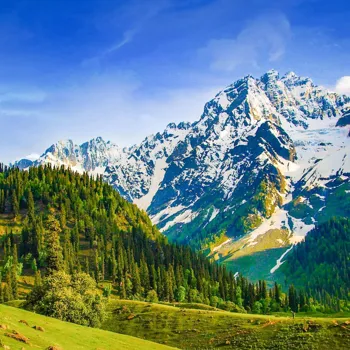
The focus is on preserving the natural beauty of the region while creating economic opportunities for local communities.
The hills of Himachal Pradesh such as Shimla, Manali are improving in Sustainable tourism.
This means supporting Eco-friendly hotels, promoting local traditions, and managing the wastage so that they don't pollute the environment. The main target is to protect the environment in the region while making sure that the state make a profit for local communities.
Andamans and Nicobar Islands: Preserving Island Ecosystem Integrity
The Andamans and Nicobar Islands, with their pristine beaches and coral reefs, are a fragile ecosystem that requires careful management. Eco-tourism efforts here focus on marine conservation, promoting responsible diving and snorkelling, managing waste effectively, and supporting local communities.

This approach helps preserve the unique biodiversity of the islands while offering visitors a responsible and enlightening experience.
The Islands of Andamans and Nicobar with their pristine beaches and amazing coral reefs is protected by the eco-tourism.
The main goal is to protect the ocean species, to ensure safe snorkelling and diving, and make sure that trash isn't ruining the ecosystem. The local communities are supported so that travelers have safe and wonderful experience.
These seven destinations exemplify the rise of eco-tourism in India.
By embracing sustainable practices and prioritizing the well-being of local communities and the environment, these destinations show that tourism can be a force for good, protecting India's natural heritage for generations to come.
So, next time you plan a trip, consider these eco-tourism hotspots and contribute to a more sustainable future for Indian tourism.
AI Generated Content. Glance/InMobi shall have no liability for the content